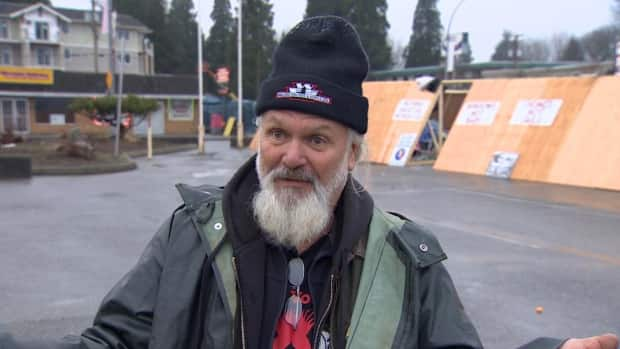No charges recommended against Mounties who fatally shot B.C. homeless advocate
Investigators have announced no charges are being recommended against RCMP officers who shot and killed a well-known homelessness advocate in B.C. earlier this year, an outcome in another case his family says could have been resolved without the use of deadly force.
Barry Shantz was fatally shot after police were called to his home in the Lytton area, southwest of Kamloops, on the morning of Jan. 13. The Independent Investigations Office of B.C. said he was suicidal and barricaded inside the house with a shotgun.
When Shantz came out of the house that afternoon carrying the gun, officers fired.
Shantz's younger sister, Marilyn Farquar, said the case highlights shortcomings in the way police resolve encounters between officers and those experiencing a mental health crisis.
"We want to challenge them … There's a lot I'd like to see changed," said Farquar, who drove to B.C. from her home near Waterloo, Ont., to advocate for her brother and policy change this week. "I'd like to see people come to the table ... and figure out how we can move forward.
"Can we not agree that killing someone isn't what we should be doing?"

Shantz was recognized around the province in the years before his death for fighting the City of Abbotsford for the right for people to camp overnight in a city park, winning a landmark court victory in 2015 that set legal precedent for people who are homeless throughout B.C.
Farquar said he struggled with his mental health and post-traumatic stress disorder.
"He was at my house in September and he shared with me his concerns. I knew he was struggling. I didn't realize to what extent. When he was at my house, he said he wanted his miracle," she said, speaking in Abbotsford on Monday.
Police called on Jan. 13
Police went to Shantz's home in Lytton the morning of his death after a relative phoned 911 around 8 a.m. PT, according to the IIO. The caller said Shantz had "never hurt a soul," but was clearly in crisis.
Two witnesses, both believed to be Shantz' relatives, were locked in the basement of the home by the time police arrived just after 8 a.m. PT. Shantz fired at the responding officers but missed, according to the IIO.
Shantz called 911 himself two hours later, after the witnesses in the basement were able to leave the house.
He told the operator he planned to walk out the front door at 2:06 p.m. and wanted police to shoot him six times.

Crisis negotiators and another witness tried to talk Shantz out of the plan, but he was shot just after 2:05 p.m. PT.
"There was nothing to suggest that [Shantz] was surrendering. It was not necessary to wait until he actually pointed the shotgun at someone or pulled the trigger — it would only have taken moments for him to do so," read Tuesday's investigation report, explaining the IIO's reasoning against recommending charges to the Crown.
"In those circumstances ... it was not unreasonable for [the two officers] to decide that lethal use of force was necessary and proportionate to the risk."
On Tuesday, Ron MacDonald, chief civilian director of the IIO, told reporters police had an obligation to ensure an "armed and mentally unstable man" was not able to escape the home into the community.
Farquhar has filed a complaint with the Civilian Review Complaints Commission (CRCC) about her brother's case. The commission referred her back to the RCMP, which said its own investigation was on hold until the IIO's work was done.
"The CRCC, to my understanding, that's where changes to protocol and procedure can be done," she said.
"The first thing is, do we have to result to fatally killing somebody and are there other options that weren't exhausted when you jumped to that one? I can see places that were skipped and missed."
In an email on Tuesday, RCMP Staff Sgt. Janelle Shoihet confirmed the complaint continues to be investigated and the results will be provided privately to the complainant.
"We fully participated in IIO BC's investigation and respect the investigative decision and outcome," Shoihet said.
Shantz was the oldest of three children, leaving home in Ontario at 17 to settle on the West Coast. He left behind a son who, Farquhar said, was not informed of his father's death for two days.
"Barry made a significant contribution to society ... he was an advocate for marginalized people and here I am, having to be an advocate for my brother now," Farquhar said.
Where to get help:
Canada Suicide Prevention Service: 1-833-456-4566 (Phone) | 45645 (Text) | crisisservicescanada.ca (Chat)
In Quebec (French): Association québécoise de prévention du suicide: 1-866-APPELLE (1-866-277-3553)
Kids Help Phone: 1-800-668-6868 (Phone), Live Chat counselling at www.kidshelpphone.ca
Canadian Association for Suicide Prevention: Find a 24-hour crisis centre
If you're worried someone you know may be at risk of suicide, you should talk to them about it, says the Canadian Association for Suicide Prevention. Warning signs can include:
Suicidal thoughts.
Substance abuse.
Purposelessness.
Anxiety.
Feeling trapped.
Hopelessness and helplessness.
Withdrawal.
Anger.
Recklessness.
Mood changes.


